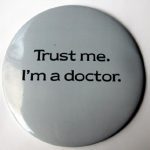Finding a Healthcare Provider
Dr. McDougall’s goal is for you to be healthy and to only see a health care professional to obtain services if and when it is absolutely necessary.
Many people want to know what is the best way to find a doctor who understands Dr. McDougall’s approach. Dr. McDougall wrote “How to Choose a Primary Care Doctor – If You Must” to answer this question.
Here is an excerpt from the article
“You shouldn’t even look for a vegetarian-oriented doctor…You don’t really care what your doctor personally eats, as long as his bad habits don’t turn into unhealthy recommendations. However, you do want a doctor who will respect your diet and lifestyle choices and not try to undermine them—or worse yet, challenge you with nonsense like the Atkins Diet or the South Beach Diet.
Ideally, you are looking for a traditionally-trained doctor, not completely brain-washed by the pharmaceutical and medical device industries, who is interested in you becoming healthy through better self-care, and by your being actively involved in your own healthcare.”
Read the Article
+-Reprint from October 2005 McDougall Newsletter
How to Choose a Primary Care Doctor—If You Must
Sick people visit doctors, take medications, and undergo surgeries—healthy people don’t. Your goal is to get as far away as possible from the medical and pharmaceutical businesses. The only way to safely accomplish these goals is to become and remain healthy. Genuine health comes from proper nutrition (a near vegetarian, low-fat diet), clean air and water, moderate activity, adequate sunshine, and a comfortable psychosocial environment. Unfortunately, even with the best intentions, and after the most sincere efforts to obey life’s basic rules, medical services may be required.
Establishing a Relationship with a Doctor Can Wait
 An undeniable fact is that the more you see doctors, the more likely you are to be tested and treated—for better or worse. Therefore, establishing a relationship with a doctor opens the door for you to become an active patient. You don’t want to be a patient. Most major health organizations agree there is the risk for serious harm in establishing a regular doctor-patient relationship and all have agreed that routine annual checkups for healthy adults should be abandoned. (See the July 2005 McDougall Newsletter article: The Annual Physical Exam – A Ritual to Be Avoided.)
An undeniable fact is that the more you see doctors, the more likely you are to be tested and treated—for better or worse. Therefore, establishing a relationship with a doctor opens the door for you to become an active patient. You don’t want to be a patient. Most major health organizations agree there is the risk for serious harm in establishing a regular doctor-patient relationship and all have agreed that routine annual checkups for healthy adults should be abandoned. (See the July 2005 McDougall Newsletter article: The Annual Physical Exam – A Ritual to Be Avoided.)However, most people are taught the opposite—they believe they need a trusted personal physician who knows them intimately in case of an emergency or other unexpected illness. This sounds like a good plan. Unfortunately, in the real world when the day comes that you need care, your chosen doctor is likely to be unavailable—you will have to see the “doctor-on-call” or visit the local emergency room or an outpatient facility. Furthermore, long-standing familiarity with a patient is rarely necessary in order to provide excellent care in times of need—a brief past history of allergies, medications and illnesses is usually sufficient.
Don’t Choose an “Alternative Medicine Doctor”
 Readers of this newsletter have often lost faith in standard medicine and are therefore inclined to look for alternative approaches, and that means doctors with a reputation for providing “unconventional” or “holistic” care. My experience has been that most of these “alternative” physicians are still focused on “pills for ills.” The difference is they are prescribing vitamins, minerals, natural hormones, and other supplements—with enthusiasm. The results of their remedies are similar to the ones sold to you by pharmaceutical companies, providing few benefits with significant costs and side effects. Other alternative doctors use methods that have not been established to be beneficial, such as those using chelation and ozone therapy—so be careful.
Readers of this newsletter have often lost faith in standard medicine and are therefore inclined to look for alternative approaches, and that means doctors with a reputation for providing “unconventional” or “holistic” care. My experience has been that most of these “alternative” physicians are still focused on “pills for ills.” The difference is they are prescribing vitamins, minerals, natural hormones, and other supplements—with enthusiasm. The results of their remedies are similar to the ones sold to you by pharmaceutical companies, providing few benefits with significant costs and side effects. Other alternative doctors use methods that have not been established to be beneficial, such as those using chelation and ozone therapy—so be careful.You shouldn’t even look for a vegetarian-oriented doctor, because you do not need someone to tell you AGAIN to eat a low-fat, near plant-food based diet (The McDougall Diet), to exercise, to not smoke, etc.—you know all of these fundamental rules. You don’t really care what your doctor personally eats, as long as his bad habits don’t turn into unhealthy recommendations. However, you do want a doctor who will respect your diet and lifestyle choices and not try to undermine them—or worse yet, challenge you with nonsense like a high-fat, low-carb diet (keto), the Atkins Diet or the South Beach Diet.
Ideally, you are looking for a traditionally-trained doctor, not completely brain-washed by the pharmaceutical and medical device industries, who is interested in you becoming healthy through better self-care, and by your being actively involved in your own healthcare.
The Character of the Right Doctor
Your relationship with your doctor should be a “partnership” focused on improving the quality and quantity of your life. This requires comfortable communications and trust. The right doctor will be passionate about the study of medicine and as a result will be very knowledgeable about the care of a human being. This doctor will be willing and able to clearly explain your present condition and the possible courses of action for you to take—including several different ways to test and treat your problems. There are almost always options for your care; for example, your colon can be examined with an optical colonoscopy, virtual (computer based) colonoscopy, or a barium enema and sigmoid examination. Another example: for blocked heart arteries with chest pain you can have bypass surgery, angioplasty, medications, and/or dietary change. You should hear about all of the available options along with their costs, risks, and advantages. If you are hearing “My way is the only way,” then you are likely with the wrong doctor. Remember, as the health care consumer—the customer—you always have the right to say “No.” Your doctor must face the fact that you have the most to lose or gain in this relationship and therefore, must be comfortable with you having the final say in all decisions. Unfortunately, this is rarely the case. I have heard doctors respond to a patient’s request with angry retorts such as: “When did you go to medical school?” and “Find another doctor if you are unwilling to follow my advice.”
Secondary concerns for you may be your doctor’s manners, personal appearance, politics, and religious beliefs.
Find a Generalist for All of Your Basic Needs
Generalists, general practitioners, family practitioners, and primary care doctors are descriptive terms for the role of the doctor whom you should be seeing first and foremost for your medical care. Your generalist will act as your advocate if the time comes when you do need to see a specialist (more on this in a future newsletter). Internists and family physicians are the two largest groups of generalists for adults. Pediatricians and family practitioners act as primary care doctors for children. Many women see obstetricians/gynecologists for these basic needs, but this can be a little risky. You do not want to have a specialist acting as your generalist. Consider that women who have a gynecologist as their primary care doctor are twice as likely to have a hysterectomy as women cared for by a general practitioner.
Whom to Ask to Find a Doctor?
Finding the right doctor when you need one is well worth the hours required in the search.
The best persons to ask about desirable doctors are hospital nurses—they see doctors at their best and worst. This advice does not work for nurses working in private offices, because of their loyalties to their employers. If you don’t know a nurse then ask anyone who works in a hospital—here the “grapevine” of gossip is well-established and you can expect reliable information on the “best” doctors from almost any hospital employee.
If you do not know anyone working for a hospital, you might try establishing a new relationship. Call your local hospital and ask for the “Medicine Ward,” “Surgical-care Rooms,” “Geriatrics Unit,” or “Obstetrics Floor.” When the receptionist or nurse comes on the line tell her, “I’m new to the area and looking for a general doctor, could you give me several names?” You will be surprised how friendly and willing to help most people can be.
You should ask friends and relatives about their experiences too. However, their opinions are usually based on personal relationships rather than the quality of professional care, and their experiences may be so individualized that they do not really apply to you.
Don’t fall for the “Ask a Nurse” telephone referral services. These are companies hired by doctors to help them build their practice. Local medical societies usually have a physician referral service and will give you names based on your geographical area and the type of physician you need. However, the value of this information is no more helpful than what you can find under the “Physician” heading in the Yellow Pages.
Before Meeting the Doctor
If you have an insurance plan which has a select group of doctors with whom they contract, then you may want to limit your search to these doctors. If you choose a physician who is not participating in your insurance program, then you need to know how much this will cost you extra out-of-pocket. Next you will be contacting the doctor’s office and gathering information. Here are some valuable questions.
[message_box title=”Helpful Questions for the Office Staff:” color=”green”]
- Does the doctor have training and background to meet my needs?
- Is the doctor certified by a medical specialty board? In what specialty area?
- Is the practice location convenient? Is it accessible by public transportation? Does it have ample parking?
- What are the office hours?
- Does the office process insurance claims, or must I pay up-front for services and file the claims myself?
- Do they accept my insurance?
- Does the doctor practice alone, or as part of a group?
- Who provides care for the patients in the doctor’s absence?
- Which hospital(s) does the doctor use?
- Where are laboratory and x-ray tests performed?
- Do physician assistants and nurse practitioners provide the care, rather than the doctor?
- Will the doctor answer or return phone calls from me?
- Will the doctor answer e-mail questions from me?
- How long must I usually expect to wait for an appointment after I call?
- How often can I expect to sit in the waiting room for more than 15 minutes before being seen?
- Will I be seen on the same day if I have an urgent need?
- Does the doctor make house calls?
[/message_box]
Inform the doctor’s staff, when you make your first appointment, about how much time you will need with the doctor to ask all your questions and have your concerns addressed. Expect to pay for this time.
The Job Acceptance Interview
Before you decide on a personal physician, you may want to have an “interview appointment”—a chance to meet with the doctor when there is nothing urgent. This meeting will give you an opportunity to determine whether you are comfortable with the physician, the office staff, and the facilities. You can sit quietly and gather information during this meeting or you can ask some “ice-breaker” questions, such as the following:
[message_box title=”Blunt Questions for Your Doctor:” color=”blue”]
- Are you comfortable assuming my care with my kinds of health care problems and my personal needs?
- Do you have a special interest in my kind of health problems (heart disease, diabetes, overweight, etc.)?
- What is your view on the doctor-patient relationship; is it a “partnership” or do you expect me to just follow orders?
- How do you feel about me researching at the National Library of Medicine and bringing in articles for us to discuss? (on-line at www.nlm.nih.gov)
- How do you feel about me getting my own second opinions?
- Will you help me work with any specialists I must see and will you act as my advocate—rather than turning me over to their care?
- Do you believe people are capable of changing their diet and other habits (smoking, exercise, etc.) to regain health? Do you actively offer encouragement in this kind of behavior?
- If I decide to become healthier through diet and exercise, will you help me reduce and stop my medications?
- Will you make a conscious effort to avoid the use of medications and surgery in my care? Will you use these only as a very last resort?
- Are you comfortable with me possibly refusing to accept your prescriptions?
- Do you get angry at patients who refuse to follow your recommendations?
- If we do not complete any discussions during the office visit, will you call me after hours on the phone, e-mail my answers, and/or be willing to set up a longer appointment in the near future?
[/message_box]
Presenting these bold questions will firmly set the tone for your future care—the doctor will not soon forget you. Offending a doctor should be your last concern—the issue on the table is your health and your life or the future health of a family member. No sense in investing all your time and money in a doctor who ultimately ends up contributing to your early demise. Future newsletter articles on the doctor business will help you be in control of your destiny.
Recommended Articles

When Friends Ask: “Why Did You Quit Meat?”

Lessons from the Past, Directions for the Future: The WWI Starch Solution for Denmark






 An undeniable fact is that the more you see doctors, the more likely you are to be tested and treated—for better or worse. Therefore, establishing a relationship with a doctor opens the door for you to become an active patient. You don’t want to be a patient. Most major health organizations agree there is the risk for serious harm in establishing a regular doctor-patient relationship and all have agreed that routine annual checkups for healthy adults should be abandoned. (See the July 2005 McDougall Newsletter article:
An undeniable fact is that the more you see doctors, the more likely you are to be tested and treated—for better or worse. Therefore, establishing a relationship with a doctor opens the door for you to become an active patient. You don’t want to be a patient. Most major health organizations agree there is the risk for serious harm in establishing a regular doctor-patient relationship and all have agreed that routine annual checkups for healthy adults should be abandoned. (See the July 2005 McDougall Newsletter article:
Join the Conversation!
Have a question, a helpful tip, or a story from your journey? Add it below - your voice matters.